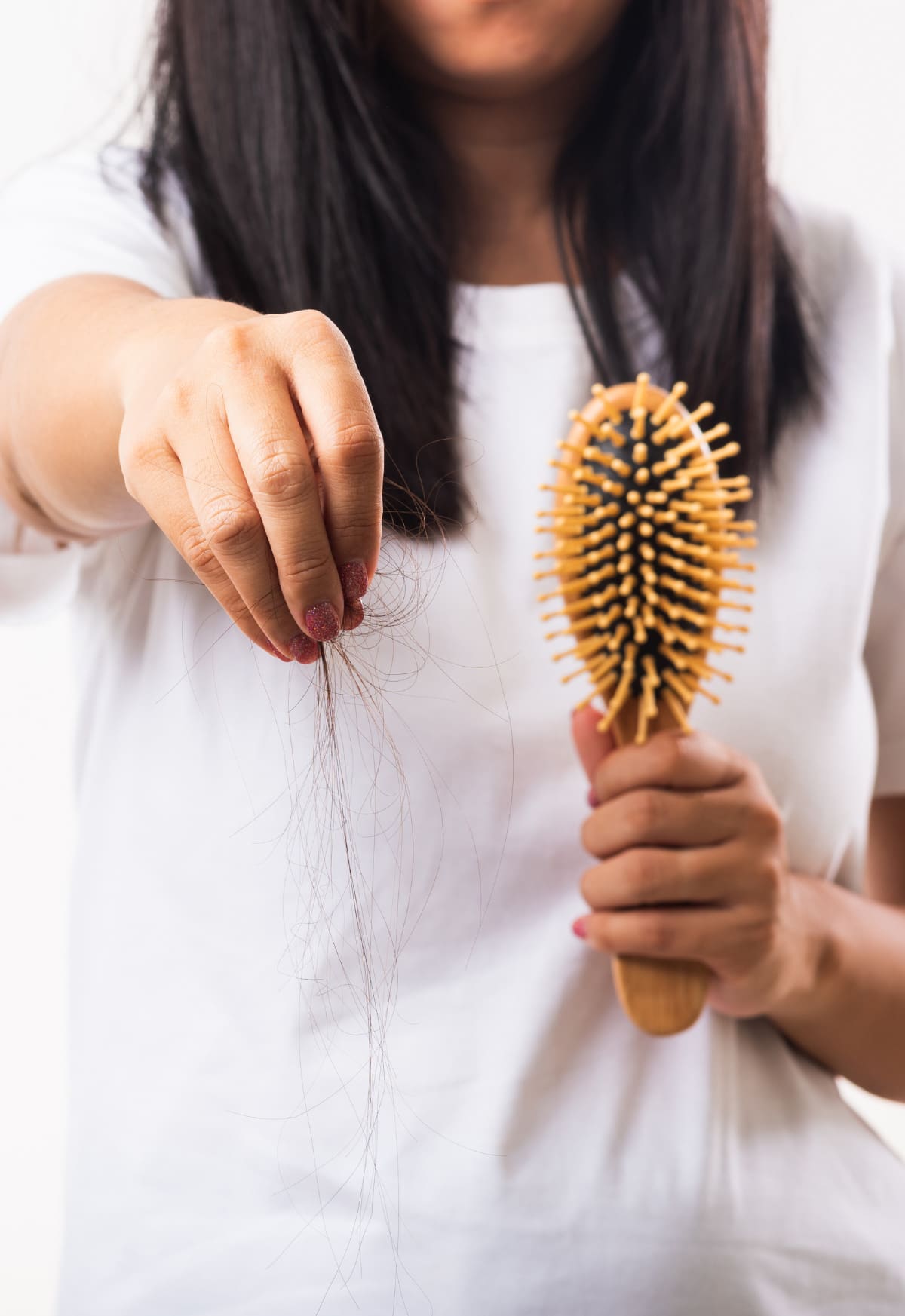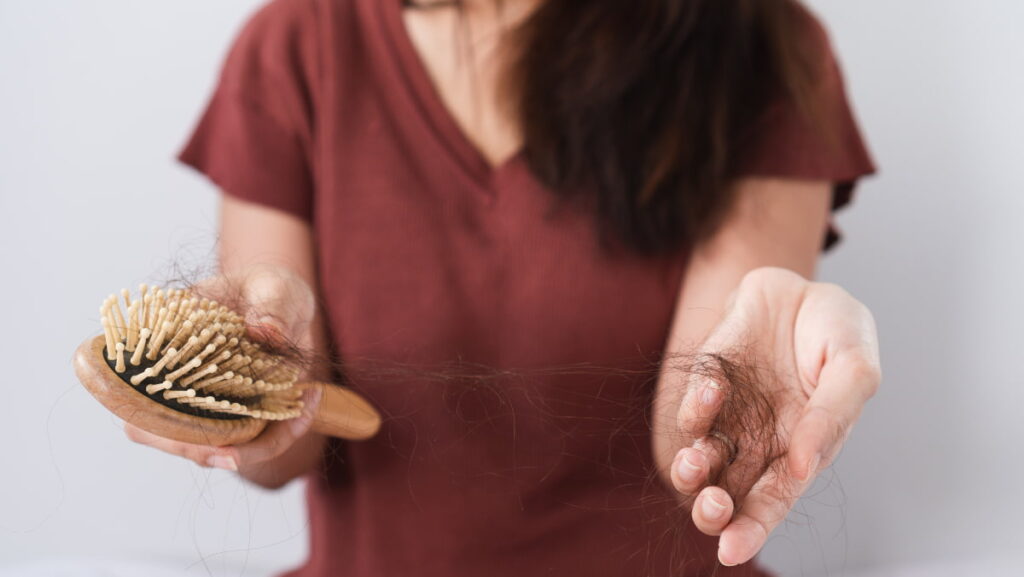
How to prevent hair loss is a common issue many of you might be dealing with now. Actually, I was struggling with hair loss myself. I still struggle with it if I neglect my haircare routine – the tricks I will share in this post!
Just know that losing a few hair strands here and there is normal and part of the hair growth cycle. However, excessive hair fall can point to a few underlying issues. Don’t panic! It doesn’t have to be a medical reason – not treating your hair properly can be the reason, too.
In this article, we quickly go over what hair loss is and what causes it so you understand where it comes from. Then, we review different methods to help you prevent hair loss. I’ll be sharing four tricks that really helped me reduce my hair loss.
Let’s dive into the realm of hair loss; a common concern rising among both men and women is how to prevent hair loss. It’s estimated that around 80 million people in the US[1] are experiencing some form of hair loss. You’re not alone!
It’s normal to lose about 50-100 hairs per day. But when you notice bald patches or lots of thinning, you may be experiencing hair loss. Hair loss, also known as alopecia[2], can occur for several reasons. Here are some primary causes:
- Genetics: If your family has a history of baldness, you could likely experience the same fate.
- Hormonal Changes: Pregnancy, menopause, and thyroid problems can cause hair loss.
- Medical Conditions: Certain diseases, such as lupus[3] or diabetes[4], can result in hair falling out.
- Medications: Hair loss could be a side effect of drugs used to treat cancer or depression.
How To Prevent Hair Loss: 4 Areas To Look At

Healthy Lifestyle Habits To Prevent Hair Loss
Are you stressing about hair loss? Worry not! Because there’s good news – with the right lifestyle habits, you can take control and prevent hair loss from happening. Let’s dive in to understand how to prevent hair loss naturally.
First up, your dietary routine matters! Eating a balanced diet rich in vitamins A, B12, C, and E and proteins can go a long way toward maintaining healthy hair growth. These nutrients are deeply linked to hair fall, enough to make you understand how to prevent hair loss. Here’s what you should include:
- Vitamin A: Sweet potatoes, carrots
- Vitamin B12: Fish, poultry
- Vitamin C: Citrus fruits like oranges
- Vitamin E: Nuts and seeds
- Proteins: Eggs, lean meat
Regular exercise is key for healthy hair growth and, at the same time, also good for your waistline. When you work up a sweat regularly, exercise improves blood circulation, delivering nutrients to your scalp more effectively. This keeps your follicles nourished, which can slow down or even halt the progression of hair loss.
Next on the list is hydration: water isn’t just essential for life itself but also plays a vital role in maintaining skin health – including that of your scalp! Aim to drink at least 8 glasses of water daily to keep yourself hydrated.
Stress is another factor that must be controlled to prevent hair loss. Chronic stress can disrupt the normal cycle of hair growth, leading to problems such as shedding or thinning hair. Consider integrating mindfulness practices such as yoga or meditation into your daily schedule.
Hair Care Tips To Prevent Hair Loss
Let’s go over 4 hair care tips to really help me reduce the amount of hair loss and bring it back to a normal level again. I adjusted my haircare routine and added or removed the following things:
Massage the Scalp
Massaging the scalp stimulates blood flow, which is good for your follicles. While the evidence is still in the early stages, some studies suggest that routine scalp massages may lead to thicker hair.
A simple way to incorporate this into your routine is to spend a few minutes massaging your scalp before shampooing or when applying hair oil. Use gentle, circular motions—no need to be rough, as the goal is to invigorate, not irritate. You can also use essential oils diluted with a carrier oil, like jojoba or coconut, for added benefits.
Avoid Hairstyles that Pull on the Hair
I love a good bun, but I try to avoid it as much as possible. If you’re partial to a tight ponytail or a sleek bun, you might want to loosen up—literally. Traction alopecia[5] is a type of hair loss caused by constant pulling on the hair follicles. Here’s what you can do:
- Wear your hair loose or in looser styles to alleviate scalp tension.
- Opt for softer hair ties that don’t snag or pull. My favorite ones are these from Invisibobble.
- Swap out tight braids or weaves for more hair-friendly designs.
Avoid High-Heat Hair Styling Tools
It’s well known that heat styling can take your hair from fab to frazzled. High temperatures can weaken hair proteins and speed up hair loss. Here’s what I did and you can do too:
- Lower the temperature on heat styling tools.
- Always use a heat protectant before blow-drying or ironing.
- Try heat-free styling methods for curls and waves.
- Allow your hair to air dry when possible to give it a break from the heat.
Remember, it’s not just about the heat but also the frequency. Try to limit heat styling to special occasions rather than a daily ritual.
Use a Soft Brush Made from Natural Fibers
A rough brush can cause unwanted breakage and further distress your hair. Using a soft natural bristle brush can detangle gently without creating damage. Here’s why natural fibers are the way to go:
- They’re less likely to cause static.
- They help distribute your hair’s natural oils from root to tip.
- They’re typically more forgiving on your scalp and hair.
Go easy on wet hair, too, as it’s more susceptible to breakage. Brush starting from the tips and work your way up to avoid pulling and damaging the hair shaft. My favorite brush to use on wet hair is the Tangle Teezer The Ultimate Wet Detangler Brush.
Medical Treatments For Hair Loss
Medical treatments can also help you treat hair loss. Minoxidil, by its brand name, Rogaine, is widely recognized as the best hair loss prevention treatment. This over-the-counter medication operates by prolonging the growth phase of your hair follicles, allowing them to generate longer and denser strands. You’ll typically see results within three to six months of consistent use.
Another FDA-approved treatment is Finasteride, marketed as Propecia. Unlike Minoxidil, which is applied directly onto the scalp, Finasteride comes in pill form, and it reduces the body’s production of DHT – a hormone known to shrink hair follicles and cause baldness.
For individuals seeking more intensive treatment options, hair transplant surgeries might be considered. These surgeries involve moving healthy hair follicles from one part of the scalp to areas experiencing thinning or baldness. In addition:
- Low-Level Laser Therapy (LLLT) uses lasers to stimulate cellular activity and promote hair growth.
- Platelet-Rich Plasma (PRP) therapy involves injecting plasma-rich platelets into your scalp, which helps rejuvenate dying cells around your hair follicles.
During a PRP treatment, a small blood sample is collected and processed to separate platelets
and fibrin, crucial components that promote healing and aid tissue repair. This concentrated PRP
is then expertly administered or injected into the targeted area, releasing growth factors and
cytokines to activate your body’s natural healing mechanisms.
Consequently, this procedure is also known as platelet-rich fibrin (PRF). You can find more information about PRF therapy at Selphyl and other reputable online resources. The treatment duration varies depending on the healthcare provider’s specific protocol and the patient’s needs.
Typically, a standard PRP session lasts about 30 minutes to an hour. Multiple sessions are often recommended over several months to achieve optimal results, so the total time commitment for PRP therapy may span several appointments.
Following the injection, your healthcare provider may provide instructions for post-treatment
care, including recommendations for avoiding certain activities or products. Allow your body
time to heal. Rest for 24 to 48 hours.
Also, avoid rubbing the treated area to prevent infection or irritation. Protect the PRP-treated area from direct sunlight exposure for a few days. Moreover, use lukewarm water when showering or bathing. Avoid hot tubs or saunas for a few days.
Remember, though: while these treatments can significantly slow down or even reverse hair loss, they’re not guaranteed cures.
Consult a healthcare professional before starting any new treatment regimen for better advice tailored specifically for you based on factors such as age, health history, and extent of current hair loss condition.

When To Consult A Doctor For Hair Loss Concerns
Experiencing hair loss can be distressing. But how do you know when it’s the right time to consult a doctor? Here are a few instructions that might help.
If your hair loss is sudden or patches of baldness have appeared unexpectedly, it’s best to seek professional advice. Your doctor can help determine if an underlying health issue is causing the problem. For instance, conditions like thyroid disease or nutritional deficiencies can lead to hair loss.
Similarly, losing more than the typical 50-100 strands of hair a day could be cause for concern. Another red flag is if your scalp becomes painful or inflamed in any way – this isn’t normal and should always warrant a trip to the doctor’s office.
You may also want to seek medical attention if:
- You notice thinning around the temples
- The top of your head starts showing more scalp
- Your part widens
Final Thoughts On How To Prevent Hair Loss
You’ve reached the end of our comprehensive guide on how to prevent hair loss in men and women. It’s clear that there isn’t a universal solution to this common issue. However, armed with the right wits and tools, you’re now empowered to make informed decisions regarding your hair health.
By adopting a healthier lifestyle, implementing haircare tricks, or medical treatment, you can potentially slow down or even prevent hair loss. Remember that what works for others might not work for you; it’s all about finding what suits your unique needs and circumstances.
Frequently Asked Questions
How we reviewed this article
- Process
